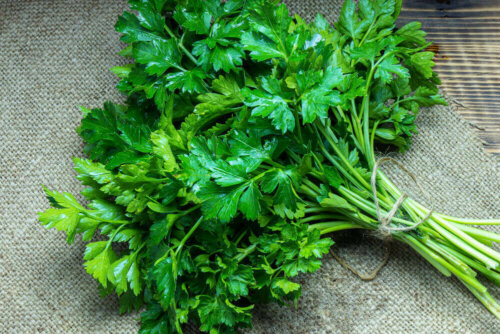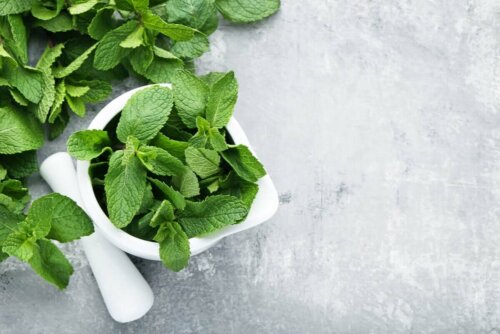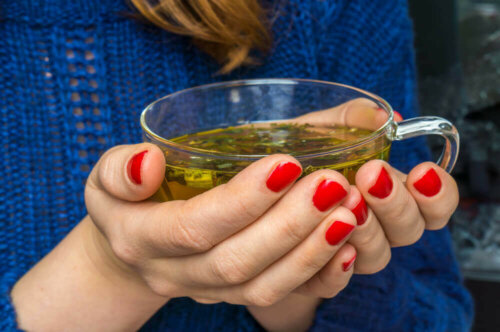Strengthen Your Liver with This Parsley-Mint Infusion


Written and verified by psychologist Valeria Sabater
A parsley-mint infusion can be quite refreshing, as well as cleansing. Once you have the ingredients at hand, it’s very easy to prepare at home and you can include it regularly in your diet, without having to worry too much about how many glasses you should have per day.
Below we’ll discuss in more detail the benefits that each of its ingredients can provide and also how to prepare the drink.
You might like: Treat Your Fatty Liver With These Five Artichoke Recipes
Guard your liver with parsley and mint

The liver is the largest organ in the body and has many different functions: it helps digest food, synthesizes enzymes and proteins, eliminates toxins, and stores energy. Given its vital importance, have you ever thought about how you take care of it on a daily basis?
The decisions you make every day have a great influence on your health, hence the importance of minding your habits.
Eating poorly and taking little time to make the right food choices when shopping can damage your gastrointestinal and liver health and affect your quality of life. Therefore, it’s important to learn to adopt healthy and sustainable diets, such as the Mediterranean diet or the Harvard plate.
Parsley, more than a garnish
According to data from the Fundación Española de Nutrición (FEN), parsley contains protein, fiber, calcium, iron, potassium, vitamin A, folate, thiamine, flavonoids, myristicin and apiol. Thus, some believe that adding fresh parsley to your meals can be good for liver health.
Animal studies reveal that parsley extract could prevent liver damage, protect it from oxidative stress, and improve its function. However, research is still lacking.
However, experts explain that the proportion used in gastronomy doesn’t justify the contribution of nutrients to the intake of any person. In other words, it’d be necessary to consume large quantities of fresh parsley to obtain a significant benefit.
Mint, beyond desserts

Like parsley, this is an aromatic herb that helps give a pleasant touch to various preparations. In turn, FEN experts indicate that mint contains proteins, calcium, iron, menthol, riboflavin, folates, vitamins A, C and E.
Mint has digestive properties, therefore, in addition to being often used for culinary purposes, it’s used as a natural remedy to relieve various common discomforts.
The use of medicinal plants is usually based on ancestral practices and traditional remedies. There are few scientific studies on the subject. In the case of peppermint, its liver benefits are also scarce and only tested on animals.
In any case, some studies show that peppermint essential oil has antioxidant and anti-inflammatory effects that could protect the liver from oxidative damage.
Discover how to treat abdominal bloating
A recipe for parsley-mint tea
To prepare this delicious and healthy parsley and mint tea, we recommend you get fresh ingredients. Besides, you can squeeze a little lemon juice to give it a citric touch and therefore, some antioxidant contribution.
Ingredients
- Fresh parsley (5 grs)
- Fresh mint (10 grs)
- 1 c. of water (250 grs)
- 2 tbsp. of lemon juice (20 ml)
Preparation
- Firstly, wash the mint and parsley.
- Next, chop the parsley and the mint to facilitate a more efficient infusion.
- Then, heat a cup of water in a pot or kettle. Once it comes to a boil, add the two herbs.
- Allow it to steep for approximately 20 minutes, and then let it steep for 10 minutes.
- Finally, strain off the liquid and set aside.
- Pour it into your favorite mug along with the lemon juice.
Note: you can skip the lemon, it’s just to make it more appetizing and refreshing.

Parsley and mint tea won’t…
Although drinking this tea can be beneficial within a healthy lifestyle, keep in mind that by itself, it won’t take care of the liver or protect the health of your whole body. Therefore, it’s not advisable to rely on it alone. The ideal thing is to include it in a healthy lifestyle.
Remember it isn’t advisable to resort to natural remedies as a substitute for the medications prescribed by the professional. They may provide relief at specific moments, but can never replace a medical strategy.
Instead, keep in mind that each organism is different and what works for one may not work for another. Thus, phytotherapy and related products must be used with caution and always within a healthy lifestyle.
In addition, some people should refrain from taking herbal infusions for medicinal purposes. This is the case of pregnant and lactating women and young children. If you have a chronic illness or are undergoing pharmaco treatment, consult your doctor about including this infusion in your daily routine.
Furthermore, if you’re concerned about the health of your liver or think you might have a liver problem, consult your doctor to avoid possible complications. Some of the main symptoms are:
- Yellowish color in skin and eyes (jaundice)
- Abdominal pain and swelling
- Nausea or vomiting
- Loss of appetite
- Tiredness
- Swelling in legs and ankles
- Dark urine
What else you can do to take care of your liver
Taking care of your liver is necessary to protect it from possible diseases and to optimize its functions. And the best way to do this is adopt healthy lifestyle habits and leave harmful practices aside.
According to the experts of the Fundación Americana del Hígado, these would be some of the basic steps to follow:
- Have an well-balanced diet that include fruits, vegetables, legumes and whole grains high in fiber. Also healthy fats (nuts, vegetable oils, fish), dairy products (with a moderate amount of fat) and white meat.
- Furthermore, avoid red meat, processed foods, fast food, undercooked seafood and fish and refined carbohydrates. Also alcohol and sugary soft drinks.
- Maintain a healthy body weight and avoid energy-dense foods.
- Avoid exposure to products that are toxic for your liver such as tobacco, insecticides, chemical additives and cleaning products. If you must use them then wear adequate protection and in ventilated spaces.
- Avoid the consumption of drugs and medications not prescribed to you.
- Exercise regularly so your body can use triglycerides as a source of energy and reduce the possible accumulation of fat in your liver.
- Maintain all necessary hygiene and safety measures to avoid possible sources of infections such as hepatitis.
If you have doubts about how to adopt and maintain good lifestyle habits, consult your doctor. This professional will be able to tell you what’s most appropriate, according to your characteristics, needs, and objectives.
Add parsley and mint to help the liver in its functions
These two seasonings can be used regularly to add flavor and aroma to all kinds of dishes. In addition, incorporating an infusion made with their leaves can contribute to better liver health and optimal digestion.
You may take this parsley-mint infusion alone or blended with other medicinal plants that also have liver protecting properties. Some of them are garlic, citrus fruits, caraway, thistle or turmeric.
Finally, the best way to take care of your liver on a daily basis is to maintain healthy lifestyle habits. These plants are an additional aid you should take in moderation and always under medical supervision.
All cited sources were thoroughly reviewed by our team to ensure their quality, reliability, currency, and validity. The bibliography of this article was considered reliable and of academic or scientific accuracy.
- American Liver Foundation. 13 ways to a healthy liver. Junio 2021.
- Bellassoued K, Hsouna A. B, et al. Protective effects of extract of Mentha piperita L. leaf essential oil against CCl4 induced hepatic oxidative damage and renal failure in rats. Lipids in Health and Disease. enero 2018. 17:9.
- Fundación Española de la Nutrición. Menta.
- Fundación Española de la Nutrición. Perejil.
- Guan Y-S, He Q. Plants consumption and liver health. Evidence Based Complementary and Alternative Medicine. Junio 2015. 824185.
- Mayo Clinic. Enfermedad hepática. Abril 2022.
- Medline Plus. Biblioteca Nacional de Salud. Enfermedades del hígado. U. S. Department of Health and Human Services.
- Rasouli H, Adibi H, et al. Peppermint and its functionality: a review. Archives of Clinical Microbiology. Agosto 2017. 8 (4): 1-16.
- Soliman H. A, El-Desouky M. A, et al. Hepatoprotective effects of parsley, basil, and chicory aqueous extracts against dexamethasone-induced in experimental rats. Journal of Intercultural Ethnopharmacology. Enero-Febrero 2016. 5 (1): 65-71.
This text is provided for informational purposes only and does not replace consultation with a professional. If in doubt, consult your specialist.








